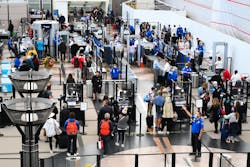U.S. Travel Association Predicts Summer Travel Boom and Plenty of Challenges
As summer 2023 rapidly approaches, the U.S. Travel Association is predicting a record-breaking season ahead, but one that’s likely to be fraught with challenges thanks to years of under-investment in the Federal Aviation Administration.
“This summer’s travel demand will be as strong as we have seen since before the pandemic,” U.S. Travel Association President and CEO Geoff Freeman said during a call with reporters. "That type of demand on a system that is understaffed and underfunded is likely to create frustrations among travelers.”
The Transportation Security Administration (TSA) expects summer air travel to surpass prepandemic levels. The agency is already screening 2 million passengers every day, and those numbers are expected to tick steadily upward in the coming months, Freeman said.
In addition, more than half of Americans (53%) and 81% of leisure travelers have travel planned in the next six months, according to a recent Ipsos poll commissioned by the association. Additionally, more than one-quarter of Americans (26%) plan to increase the amount they spend on leisure travel in the next three months.
All of which would seem to be good news. But a large part of the message during today’s call with reporters focused on how the U.S. airport and airline industry is simply not adequate to handle the demand. Recognizing that fact — and specifically, the lack of air traffic controller staffing — the FAA recently asked airlines to pull back slots at airports in New York and Washington D.C. There are 1,200 fewer air traffic controllers today than a decade ago, according to the U.S. Travel Association. And the lack of staffing comes at a time when demand for travel is skyrocketing.
Freeman blamed the traffic controller staffing shortages on policymakers who continually fail to provide the FAA with sufficient funding.
“The problems we are confronting didn’t come out of thin air and it’s not solely driven by increased demand,” he said.
“Americans are paying the price of years of chronic under-investment — in technology and staffing — by the federal government in our nation’s air travel system,” Freeman said later in a statement issued by the association. “Air travelers are right to be frustrated and to demand more from Washington.”
While demand among travelers is strong now, the association expressed concern that a summer travel season marked by challenges, delays, long lines, inadequacies, and frustrations may ultimately drive away prospective travelers. In fact, Freeman said, the subpar American airline and airport system is already causing the U.S. travel industry to lose money. He pointed to statistics from the recently commissioned Ipsos poll to underscore his point on this front. The poll showed that half of Americans (52%) say they would travel more for leisure in the next six months if the travel experience was not as much of a hassle.
“This reality is holding back economic growth,” said Freeman.
And it’s not just American travelers that the association is worried will be turned off by the current challenges associated with the U.S. travel industry. Freeman also cautioned that excessive wait times for international passengers arriving at U.S. customs checkpoints at gateway airports is also a growing concern. This too, Freeman blamed on understaffing and diversion of resources by Customs and Border Protection.
“If international visitors are forced to wait two to three hours in line, they may think twice about coming back to the United States and will certainly go home and spread that message,” Freeman told reporters.
The prolonged wait times that international travelers experience when seeking visitor visas was another significant focus of concern for the association. Here too, Freeman said the inadequacy of the U.S. travel infrastructure is causing the country to lose money and lose business. “We have yearlong waits for first-time visitor visa applicants in key markets and we have fierce competitors from other markets,” Freeman continued, pointing out that if international visitors face a hassle getting a visa to come to this country, they will simply go elsewhere.
So what’s the solution to the systemwide underfunding identified by the association? Freeman called upon lawmakers to ensure that the FAA reauthorization bill includes the following funding:
Provide at least $50 million per year for aviation workforce development programs to increase the supply of qualified pilots and mechanics.
Provide $4.5 billion in funding for air traffic control infrastructure and technology. Also provide enough funding to hire 1,800 new air traffic controllers per year over the next three years, while fixing the staffing model to ensure the controllers are in the right places.
Provide at least $4 billion per year in Airport Improvement Program Grants and enable medium and large-hub airports, which serve the majority of passengers, to keep more of their grant funding.
The systemwide challenges looming for this summer, said Freeman, are likely to be a wake-up call for policymakers. “If the government doesn’t act now, the headaches won’t just happen during peak travel seasons and holidays, it will become our daily reality,” he said.
———
©2023 Northstar Travel Media, LLC. Visit at travelpulse.com. Distributed by Tribune Content Agency, LLC.
